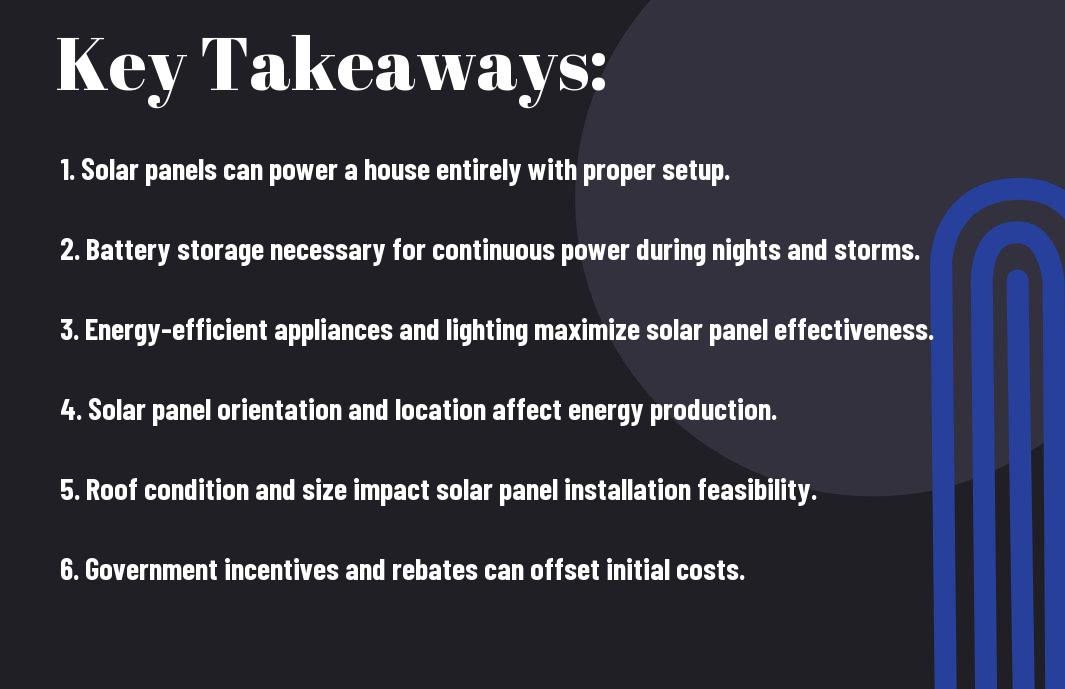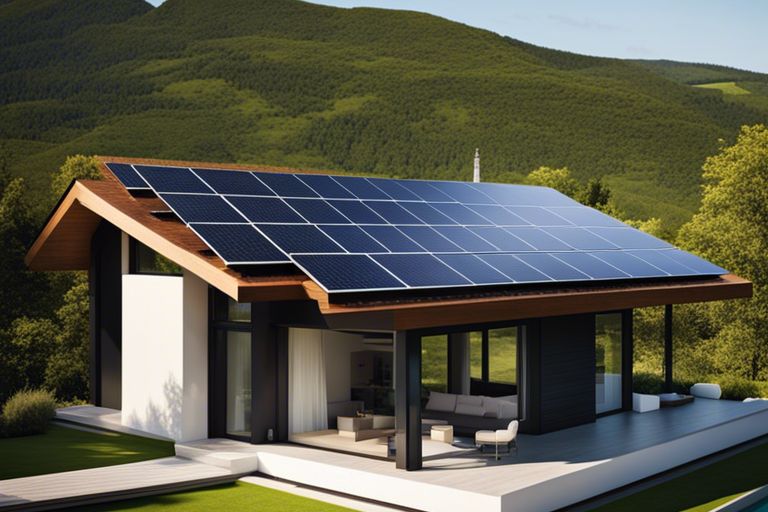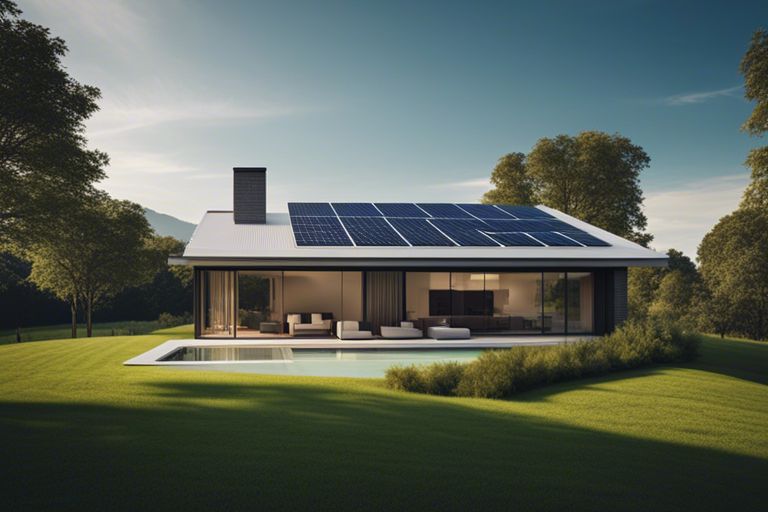Technology has advanced by leaps and bounds, but the idea of powering your entire house solely on solar panels might still seem like a futuristic concept to you. So, can a house run fully on solar panels? In this blog post, we’ll investigate into the possibilities and challenges of relying exclusively on solar power to meet your energy needs. Buckle up, because we’re about to shed some light on this electrifying topic.
Key Takeaways:
- Solar panels can fully power a house: With the right design, location, and size of the solar panel system, it is possible for a house to run fully on solar power.
- Battery storage is necessary: To ensure continuous power supply, having a battery storage system to store excess energy generated during the day is crucial for running a house on solar panels.
- Efficiency and energy usage play a role: The energy efficiency of the house and the amount of energy appliances and electronics consume also impact the feasibility of running a house fully on solar panels.


The Basics of Solar Power
How Solar Panels Work
A common misconception is that solar panels generate electricity directly from sunlight. However, the process is a bit more complex. Solar panels are made up of photovoltaic cells that convert sunlight into direct current (DC) electricity. This electricity is then converted into alternating current (AC) power by an inverter, making it usable for your home appliances.
Advantages of Solar Energy
Energy from the sun is abundant and renewable, making it a sustainable source of power for your home. By harnessing solar energy, you can reduce your reliance on traditional fossil fuels, lowering your carbon footprint and contributing to a cleaner environment. Additionally, solar panels require minimal maintenance and can last for decades, providing long-term cost savings on your electricity bills.
One significant advantage of solar energy is its ability to help you save money in the long run. While the initial investment in solar panels may seem high, many homeowners see a significant decrease in their electricity bills over time. In some cases, you may even generate excess power that can be sold back to the grid, further offsetting your energy costs.
Assessing Your Energy Needs
Assuming you are considering running your house fully on solar panels, the first step is to assess your energy needs. This involves calculating your energy consumption and identifying which appliances in your home are energy-hungry.
Calculating Your Energy Consumption
One way to start assessing your energy needs is by calculating your energy consumption. Look at your past utility bills to get an idea of how much electricity you use on average each month. This will help you determine the size and number of solar panels needed to meet your energy requirements.
Identifying Energy-Hungry Appliances
Consumption of energy-hungry appliances can significantly impact your overall energy consumption. Identify appliances such as air conditioners, water heaters, and dryers that consume a large amount of electricity. By understanding which appliances are the biggest energy consumers in your home, you can prioritize where to focus your efforts when it comes to energy efficiency.
Another helpful tip is to consider replacing old, inefficient appliances with newer, energy-efficient models. This can not only reduce your energy consumption but also make it easier for your solar panels to meet the energy needs of your home.
Sizing Up Your Solar Panel System
Determining the Right System Size
After deciding to power your house fully with solar panels, the next step is to determine the right system size for your energy needs. Sizing up your solar panel system involves calculating how much energy your household consumes on average each month. By understanding your energy usage patterns, you can choose a solar panel system that will meet your needs and potentially offset your energy bills.
Considering Roof Size and Orientation
When considering the size of your solar panel system, it’s crucial to take into account your roof’s size and orientation. The amount of sunlight your roof receives can impact the efficiency of your solar panels. A well-sized system with optimal placement on a sun-exposed roof can harness more energy and maximize your savings on electricity bills.
It’s also crucial to consider any shading that may affect your roof throughout the day. Trees, nearby buildings, or even chimney shadows can decrease the efficiency of your solar panels. By understanding how your roof’s size and orientation may impact solar panel performance, you can make informed decisions about your system size and placement.

The Role of Energy Storage
Once again, one of the key components in running a house fully on solar panels is efficient energy storage. The ability to store excess energy generated during the day for use at night or on cloudy days is crucial for achieving energy independence. Energy storage systems play a vital role in balancing the supply and demand of energy in a solar-powered home.
Battery Options for Solar Systems
For battery options in solar systems, there are various choices available to you. Lead-acid batteries are a common and cost-effective option, while lithium-ion batteries are known for their efficiency and longer lifespan. Each option has its pros and cons, so it’s imperative to consider your energy needs and budget before selecting the right battery for your solar system.
Grid-Tied vs. Off-Grid Systems
Systems for solar panels can be categorized into grid-tied and off-grid systems. Grid-tied systems are connected to the utility grid, allowing you to draw electricity from the grid when needed and sell excess power back to the grid. On the other hand, off-grid systems operate independently of the utility grid, requiring sufficient energy storage to meet all of your household’s needs.
The choice between a grid-tied or off-grid system depends on your location, energy requirements, and level of self-sufficiency you wish to achieve. Grid-tied systems offer the advantage of grid backup and potential cost savings through net metering, while off-grid systems provide energy independence and the ability to live off the grid entirely.
Overcoming Energy Shortfalls
All households running fully on solar panels may face challenges due to intermittent energy sources.
Dealing with Intermittent Energy Sources
Any system reliant solely on solar power may experience energy shortfalls during periods of low sunlight or inclement weather. To combat this issue, you can consider investing in energy storage solutions such as batteries. These batteries can store excess energy generated during sunny days for use when sunlight is scarce. By incorporating a battery storage system into your solar panel setup, you can ensure a more consistent power supply for your home, even when the sun isn’t shining brightly.
Supplementing with Fossil Fuels or Other Renewables
One option for overcoming energy shortfalls in a fully solar-powered home is to supplement with fossil fuels or other renewable energy sources. While the goal of running solely on solar power is commendable, there may be times when your energy needs exceed what your solar panels can provide. In such cases, having a backup generator running on fossil fuels or incorporating other renewable sources like wind or hydro power can help bridge the energy gap.
It’s important to strike a balance between relying on solar power and utilizing other energy sources to ensure a consistent and reliable power supply for your household. By combining the benefits of different energy sources, you can create a more resilient and sustainable energy system for your home.
Real-World Examples and Success Stories
Residential Solar Installations
Installations of solar panels on residential properties have become increasingly popular in recent years. Your neighbors might have already made the switch to solar energy, significantly reducing their reliance on traditional grid power. By harnessing the power of the sun, homeowners across the globe are not only saving money on their electricity bills but also reducing their carbon footprint.
Commercial and Industrial Applications
To further illustrate the viability of solar power, let’s look at some commercial and industrial applications. From large corporations to industrial facilities, businesses are embracing solar energy to power their operations. With advancements in technology and more affordable solar panels, many companies are not only meeting their energy needs but also contributing to a more sustainable future.
With the help of solar panels, businesses can not only save money in the long run but also demonstrate their commitment to environmental responsibility. Solar energy can be a reliable and efficient source of power for various commercial and industrial purposes, ranging from powering office buildings to running heavy machinery in manufacturing plants.
Summing up
Conclusively, while it is theoretically possible for a house to run fully on solar panels, there are various factors to consider to achieve this goal. Your energy consumption, location, weather conditions, and the efficiency of your solar panels all play crucial roles in determining whether your house can be powered solely by solar energy. To dive deeper into this topic, you may want to explore the article Can I Run My Whole House on Solar Power? for more insights and information.
Q: Can a house run fully on solar panels?
A: Yes, a house can run fully on solar panels by installing enough panels to generate sufficient electricity to meet the household’s energy needs. This typically involves installing a solar panel system that is properly sized for the home and includes storage capabilities such as batteries to ensure continuous power supply even when the sun is not shining.
Q: How many solar panels are needed to run a house fully on solar power?
A: The number of solar panels needed to fully power a house depends on various factors including the household’s energy consumption, location, roof size, and panel efficiency. On average, a typical American home may need between 20 to 40 solar panels to run entirely on solar power.
Q: What are the benefits of running a house fully on solar panels?
A: Running a house fully on solar panels has numerous benefits, including reduced electricity bills, lower carbon footprint, energy independence, increased property value, and access to government incentives and rebates for renewable energy. Additionally, solar panels require minimal maintenance and can provide reliable power for years to come.
